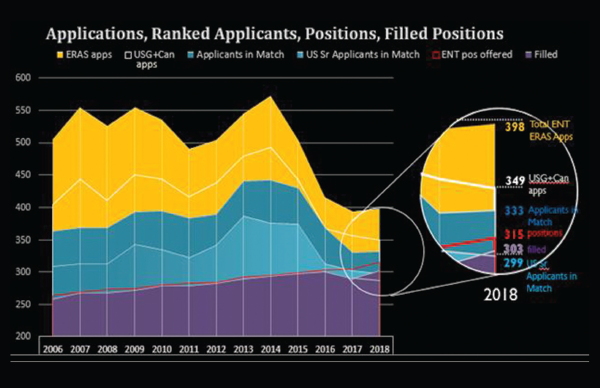Match Day has its traditions: Amid the pop of champagne corks, medical students across the country simultaneously open their envelopes to learn where they’ll spend their next few years as medical residents.
Explore This Issue
June 2018Traditionally, otolaryngology has been a much sought-after specialty. In 2014, however, the number of otolaryngology Electronic Residency Application Service (ERAS) applications began to drop; in 2017, the number
of ranked U.S. seniors who applied to the specialty (303) fell below the actual number of available positions (305), and 14 spots went unfilled after the initial match—unprecedented in recent otolaryngology matches, said David Chang, MD, residency program director and Jerry W. Templer, MD Faculty Scholar in Otolaryngology and associate professor of clinical otolaryngology at the University of Missouri in St. Louis (see Figure 1).
This year’s match didn’t fare much better, according to Dr. Chang, who collected data on match statistics: The number of ranked U.S. seniors (299) again fell below the actual number of available positions (312). And, while four more resident spots were filled in 2018 than in 2017, those additions didn’t offset the seven additional residency openings available this year.

Figure 1. Otolaryngology Residency Applications, Ranked Applications, Positions, Filled Positions.
Note: ERAS application numbers are taken from data published in February of each match year, and do not include SOAP applications.
Reprinted with permission from David Chang, MD
“We’re the only surgical subspecialty that has noticed this down trend in total applications over the last two years,” said Stacey Gray, MD, program director for the Harvard Medical School otolaryngology program and current chair of the Otolaryngology Program Directors Organization (OPDO). “Harvard didn’t have any medical students who applied to otolaryngology in the last two years; I’ve been here since 1999 and that’s never happened before. However, if you look back even further the number of applications was trending down after a very significant peak in applications, with something like a 20% non-match rate probably four to five years ago.”
Although the numbers are certainly interesting (and some say possibly alarming), the question is why residency positions are going unmatched.
Why the Drop?
There are several potential issues upon which most program directors and residency advocates agree—with the caveat that the data don’t show a clear cause:
Work/life balance. Charles Elmaraghy, MD, chief of the department of otolaryngology at Nationwide Children’s Hospital and an assistant professor of clinical otolaryngology at The Ohio State University College of Medicine in Columbus, believes that work/life balance is a priority for current medical students. “We see students with an initial interest in otolaryngology switch to less-demanding nonsurgical specialties because they want to have a ‘normal’ family life rather than the long work hours that are inherent in a surgical specialty.”